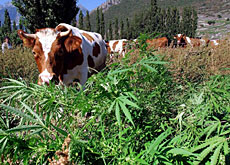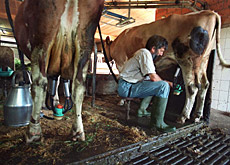Lid lifted on organic milk

Despite its healthy image, the organic milk produced in Switzerland is no better than ordinary milk, Bern University researchers have found.
What’s more, they say, this type of dairy farming may be detrimental to the health of cattle. The findings could have implications for Switzerland’s growing organic food sector, which is worth more than a billion francs a year.
Bio Suisse, the Swiss umbrella group for organic organisations, dismissed the findings of the report, which was partly funded by the Federal Agriculture Office and the Federal Veterinary Office.
“This study tells us nothing new,” Bio Suisse director Stefan Odermatt told swissinfo.
“Organic products are not automatically ‘healthier’. You have to look at organic farmland as a whole. By renouncing chemical or synthetic fertilisers, protective sprays and the preventive use of antibiotics we produce high-quality foodstuffs.”
Professor Jürg Blum and his team spent eight years studying animals raised on conventional and organic dairy farms, comparing their health, milk production and quality of milk, according to the university newspaper Uni Press.
They came to the conclusion that despite its higher price, organic milk is not better than the normal variety. On the contrary, organically produced milk contains more disease-causing bacteria.
“One thing is clear: organic milk is not, as consumers think, better than conventional milk,” the report’s authors said.
Less milk, more germs
Organic cattle produce five to 12 per cent less milk than cows in conventional production partly because their fodder is not rich enough in proteins, the researchers say.
The regulations governing organic production do not permit farmers to give their cows special dietary supplements to increase their energy. These supplements are commonly given to cows on conventional farms.
So organic cows often expend more energy in milk production than they draw from their food.
Another problem identified by the researchers is that organic cattle suffer more frequently from udder inflammation because the regulations state that organic farmers cannot administer antibiotics as a precautionary measure.
“A risk for consumers is that these germs can end up in the milk we drink,” warned the authors.
The Federal Veterinary Office said it was aware of the problem of udder infections in organic cattle but “there is no health risk because sufficient controls are carried out”.
Odermatt said it was ridiculous to reduce the quality of organic milk to the number of germs it contained. “That is completely beside the point.”
Converts to the cause
Around 6,400 farms are run in accordance with the principles of Bio Suisse, with one tenth of agricultural land given over to this type of farming.
Many Swiss consumers have been converted to the cause of organic produce. One in every ten litres of milk sold is organic, although it costs the shopper 30 to 35 centimes more than conventionally produced milk.
Bio Suisse says it is worth paying a higher price for milk produced by happy cows.
“Organically produced foodstuffs offer better value because the animals are treated correctly – allowed to run around and mingle with other animals – and receive the right food. An organic cow is a happy cow that is not trained for maximum milk production.
“Making a profit is not the main concern of organic farmers.”
swissinfo, Morven McLean
Researchers at Bern University Faculty of Veterinary Medicine have carried out two studies into the benefits of organic dairy farming.
They compared the health, nutrition and milk yield of almost 3,000 cows in around 270 organic and conventional herds.
They concluded that organic milk was not any better than conventionally produced milk.
The researchers found that organic cows produced less milk and were more prone to udder infections.

In compliance with the JTI standards
More: SWI swissinfo.ch certified by the Journalism Trust Initiative










You can find an overview of ongoing debates with our journalists here . Please join us!
If you want to start a conversation about a topic raised in this article or want to report factual errors, email us at english@swissinfo.ch.